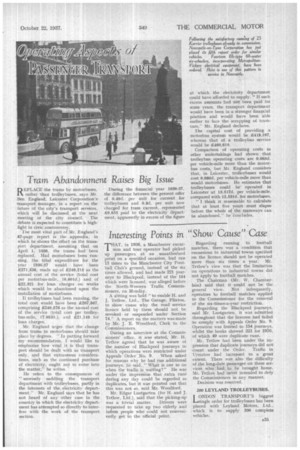Tram Abandonment Raises Big issue R EPLACE the trams by motorbuses,
Page 87

If you've noticed an error in this article please click here to report it so we can fix it.
rather than trolleybuses, says Mr. Ben England, Leicester Corporation's, transport manager, in a report on the future of the city's transport services, which will be discussed at the next meeting of the city council. The debate is expected to constitute h highlight in civic controversy.
The most vital part of Mr. England's 87-page report is the appendix, in which he shows the effect on the transport department, assuming that on April 1, 1936, the trams had been replaced. Had motorbuses been running, the total expenditure for the year 1'936-37 would have been Z271,536, made up of £249,215 as the annual cost of the service (total cost per motorbus-mile, 16.60Id.) and of £22,321 for loan charges on works which would be abandoned upon the installation of motorbuses.
If trolleybuses had been running, the total cost would have been £267,567, comprising 4246,576 as the annual cost of the service (total cost per trolleybus-mile, 17.953d,), and £21,199 for loan charges.
Mr. England urges that the change from trams to motorbuses should take place by degrees. "In putting forward my • recommendation, I would like to emphasize how vital it is that transport should be dealt with as transport only, and that extraneous considerations, such as the continued purchase of electricity, ought not to enter into the matter," he writes.
He refers to the consequences of "unwisely saddling the transport department with trolleybuses, partly in the interests of the, electricity department." Mr. England says that he has not heard of any other case in the country in which the electricity department has attempted so directly to interfere with the work of the transport section. During the financial year 1936-37, the difference between the present offer of 0.49d. per unit for current for trolleybuses and 0.8d. per unit now charged for tram current, represented £9,655 paid to the electricity department, apparently in excess of the figure
at which the electricity department could have afforded to supply. "II such excess amounts had not been paid for some years, the transport department would have been in a stronger financial position and would have been able earlier to face the 'scrapping of tramcars," Mr. England declares.
The capital cost of providing a motorbus system would be £419,197. whereas that of a trolleybus service would be £460,619.
Comparison of operating costs us other undertakings had shown that trolleybus operating costs are 0.665d. per vehicle-mile more than the motorbus costs, but Mr. England considers that, in Leicester, trolleybuses would cost 0.986d. per vehicle-mile more than would motorbuses. He estimates that trolleybuses could be operated in Leicester at 13.517d. per vehicle-mile, compared with 12.531d. for motorbuses.
" I think it reasonable to calculate that at least five years must elapse before the whole of the tramways can be abandoned," he concludes.
























































































































